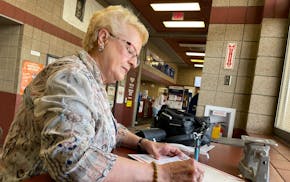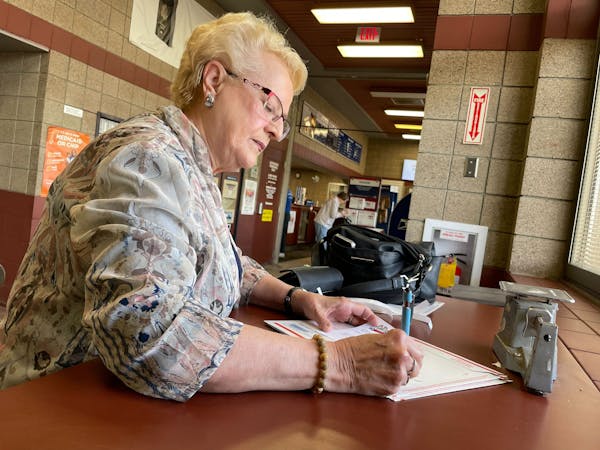To the hundreds of investors who trusted her, Kalin Dao seemed to prove that the American dream still exists.
The 32-year-old Minneapolis woman immigrated from Vietnam as a child. She overcame serious physical disabilities that left her with a profound limp. She graduated from South High in Minneapolis and went on to study economics and business at the University of St. Thomas for three years. And in 2006, after running her own travel businesses, she launched into what she had described as a can't-lose investment program focusing on securities, real estate, entertainment promotions and commodities.
But her dream of success turned out to be a nightmare, both for her investors -- who lost millions -- and for Dao, who pleaded guilty in a Minneapolis federal courtroom Thursday to conspiracy and money laundering charges. Not only that, but if her parents fail to follow through with their related guilty pleas next month, the government says it will rescind Dao's deal.
The 4-foot-11 Dao didn't seem like the kingpin of a multimillion-dollar Ponzi scheme as she hobbled up to the witness stand with the aid of a cane Thursday.
But Sgt. Kent Warnberg, a Minneapolis cop who first investigated Dao in 2002 in connection with an alleged credit card scam, then later as part of an alleged illegal gambling operation, said she fools a lot of people.
Investors trusted her bright and engaging manner. They said she responded quickly to their questions and always had reasonable answers about how she was investing their money.
Dao finally came clean Thursday when U.S. District Judge Joan Ericksen asked her to explain what she did in her own words. "Well, I did use the money ... for sports betting and table gaming," Dao admitted. Besides gambling, she admitted to sending payments to early investors as a way to lure others into her scheme.
Dao was described by a co-conspirator as high-roller at Las Vegas casinos.
According to her plea bargain documents, Dao formed a company called TD Financial Services Inc. in April 2006 to solicit funds. She set up a website that described how the money would be placed into targeted investments with specific markets and industries.
The company's promotional materials boasted that Dao and others who worked with her had investment backgrounds, and that a "partner" in the business had a seat on the New York Stock Exchange. The website said Dao and her colleagues held financial planning licenses and a "Series 7" license entitling them to sell securities.
But none of that was true. And in December 2006, Dao signed a consent decree with the Minnesota Department of Commerce that prohibited TD Financial from selling securities without a license. She changed the name of the company a few weeks later to NLC Venture Group. (Dao, through Assistant Federal Defender Lyonel Norris, said the name change was prompted by a threatened lawsuit from TD Financial Bank Group in Toronto, which was concerned that her company name would confuse its customers.)
Regardless, Dao kept promoting her investments through NLC. Her company claimed to have an exclusive software program that helped it to determine the best time to buy and sell investments, and it claimed that its contacts in Asia made it privy to inside investment information.
Dao's company also claimed to have special relationships with Las Vegas casinos, which provided other investment opportunities. Perhaps that explains why investors didn't raise questions when she had them wire money to her at the casinos.
Dao's company said investors could reap returns as high as 2,200 percent over 18 months. Dao said she and she alone created phony statements to mail to her investors.
"I'm a little bit concerned for my parents because it's part of the plea agreement here," she told Judge Ericksen. "I would like to be sure the government is going to keep its agreement with them."
Without providing any details, Assistant U.S. Attorney James Lackner said that as long as her parents show up June 11 and plead guilty in the case, they can expect the government to proceed as promised. It remains unclear what roles her parents played. Her father has worked for years as an engineer in the Twin Cities; her mother has managed at least two restaurants the family started.
Dao pleaded guilty to two counts of a 45-count indictment. The conspiracy charge put the monetary value of her fraud between $2.5 million and $7 million, though investigators have alleged in sworn statements filed in the case that she bilked investors out of as much as $10 million.
Ericksen must determine whether her scheme relied on sophisticated means. If so, it could increase her recommended prison sentence to a range of 151 to 188 months from a range of 121 to 151 months. In either case, the sentence will include up to three years of supervised release. And Dao faces the probability of a lifetime of mandatory restitution.
Dao's investors have said in earlier interviews that they don't expect to recoup much. The government found just $162,869.90 remaining in two bank accounts and a brokerage account that it intends to distribute among her many victims.
Dan Browning • 612-673-4493

Souhan: South Carolina's Staley brings humor, wisdom to St. Kate's
BCA says deputy stumbled and fell as man with knife charged in Chanhassen, prompting 2 deputies to shoot him

USPS audit found Bemidji post office delayed delivery of 79,000 pieces of mail

